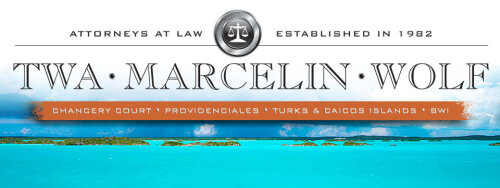Best Corporate Governance Lawyers in Turks and Caicos Islands
Share your needs with us, get contacted by law firms.
Free. Takes 2 min.
Or refine your search by selecting a city:
List of the best lawyers in Turks and Caicos Islands
About Corporate Governance Law in Turks and Caicos Islands
Corporate governance refers to the systems, rules, and processes by which companies are directed and controlled. In the Turks and Caicos Islands, corporate governance law covers the framework for running companies, managing risk, ensuring compliance, and protecting stakeholders such as shareholders, directors, employees, and customers. The territory is recognized as a favorable jurisdiction for company formation and international business, which makes sound governance particularly important. Regulatory standards in the Turks and Caicos Islands emphasize transparency, accountability, and integrity to support investor confidence and business growth.
Why You May Need a Lawyer
Legal advice in corporate governance is essential for anyone involved in managing or operating a company in the Turks and Caicos Islands. Common situations that may require legal help include:
- Setting up or restructuring a company to comply with local laws
- Drafting and reviewing governance documents, such as articles of association, shareholder agreements, or corporate policies
- Addressing director or shareholder disputes
- Navigating regulatory investigations or compliance issues
- Managing mergers, acquisitions, or other significant business transactions
- Ensuring proper reporting and transparency to regulators and stakeholders
- Advising on directors' fiduciary duties and potential liabilities
An experienced lawyer can help protect your company’s interests, avoid regulatory penalties, and safeguard your personal liability.
Local Laws Overview
The Turks and Caicos Islands’ corporate governance environment is defined by the Companies Ordinance and related statutes, supplemented by international best practices. Some key aspects include:
- Company formation, structure, and management are governed primarily by the Companies Ordinance Cap 16.08
- There are statutory requirements for directors' duties and reporting obligations
- Shareholders are protected by provisions allowing fair treatment and transparency
- Financial services businesses must comply with additional regulatory standards, including anti-money laundering and counter-terrorism financing rules
- Local companies are typically required to maintain share registers, proper accounting records, and hold annual general meetings
- There are clear processes for resolving internal disputes and removing directors when needed
- The Financial Services Commission monitors the conduct of registered entities and the adequacy of their governance frameworks
Understanding and adhering to these laws helps businesses operate securely and maintain their good standing in the islands.
Frequently Asked Questions
What is corporate governance and why is it important in the Turks and Caicos Islands?
Corporate governance is the framework for controlling and managing companies. In Turks and Caicos, it is essential for legal compliance, effective management, and maintaining investor confidence, especially due to the territory’s reputation as an international business center.
Who can be a director of a company in the Turks and Caicos Islands?
A director can be an individual or, in some cases, a corporate entity. Directors must be at least 18 years old, and certain restrictions apply if a person is bankrupt or convicted of fraud.
What are the main duties of directors under local law?
Directors must act in good faith, exercise care and diligence, avoid conflicts of interest, and always act in the best interests of the company. Failing to do so can result in personal liability.
Are there specific requirements for holding shareholder meetings?
Yes. Local companies must generally hold annual general meetings and keep records of major decisions. Notices must be given to shareholders in advance, as specified in the articles of association.
What are the common compliance requirements for companies?
Companies must keep statutory registers, file annual returns, pay government fees, maintain updated company records, and report appointments or resignations of directors and officers to the authorities.
How is a shareholder dispute typically resolved?
Disputes can be resolved through mediation, arbitration, or litigation. The company’s articles of association often contain procedures for resolving disagreements among shareholders.
What are the penalties for failing to comply with governance regulations?
Penalties can include fines, sanctions on directors or the company, removal from the register of companies, and potential legal action. Serious breaches may also affect the company’s ability to operate.
Do Turks and Caicos companies need to follow anti-money laundering compliance?
Yes. All financial service businesses must implement anti-money laundering and counter-terrorism financing measures, including customer due diligence and record keeping, in line with local laws and international standards.
Can a foreigner be a shareholder or director in a Turks and Caicos company?
Yes. Foreigners can hold shares and serve as directors in Turks and Caicos companies, subject to certain regulatory and licensing requirements depending on the business sector.
How do I dissolve a company in the Turks and Caicos Islands?
A company can be voluntarily wound up by its shareholders or compulsorily by order of the court. Legal advice is recommended to ensure compliance with statutory procedures and to settle all outstanding obligations.
Additional Resources
For more guidance on corporate governance, you may find the following organizations helpful:
- Turks and Caicos Financial Services Commission - regulatory oversight and company registration
- Chamber of Commerce - business support and resources for governance best practices
- Government legal portals - up-to-date legal texts and ordinance copies
- Professional legal associations - directories of licensed corporate law specialists
Next Steps
If you need legal assistance with any aspect of corporate governance in the Turks and Caicos Islands, consider the following steps:
- Identify your specific needs, such as company formation, compliance review, or dispute resolution
- Gather relevant documents, such as company articles, agreements, and previous legal correspondence
- Consult with a lawyer who specializes in corporate or commercial law in the Turks and Caicos Islands
- Ask for a clear outline of legal fees, timelines, and the proposed strategy for your situation
- Follow professional advice to implement improvements in corporate governance and compliance
Taking timely legal advice ensures your business is protected and operates according to the highest local and international standards.
Lawzana helps you find the best lawyers and law firms in Turks and Caicos Islands through a curated and pre-screened list of qualified legal professionals. Our platform offers rankings and detailed profiles of attorneys and law firms, allowing you to compare based on practice areas, including Corporate Governance, experience, and client feedback.
Each profile includes a description of the firm's areas of practice, client reviews, team members and partners, year of establishment, spoken languages, office locations, contact information, social media presence, and any published articles or resources. Most firms on our platform speak English and are experienced in both local and international legal matters.
Get a quote from top-rated law firms in Turks and Caicos Islands — quickly, securely, and without unnecessary hassle.
Disclaimer:
The information provided on this page is for general informational purposes only and does not constitute legal advice. While we strive to ensure the accuracy and relevance of the content, legal information may change over time, and interpretations of the law can vary. You should always consult with a qualified legal professional for advice specific to your situation.
We disclaim all liability for actions taken or not taken based on the content of this page. If you believe any information is incorrect or outdated, please contact us, and we will review and update it where appropriate.
Browse corporate governance law firms by city in Turks and Caicos Islands
Refine your search by selecting a city.














